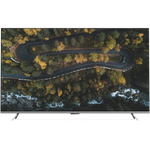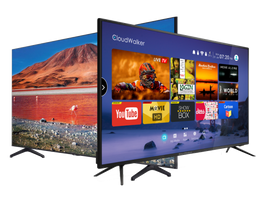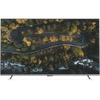A comparison of specs, key information, reviews, and best pricing from top retailers
Last updated 24 hours ago |
Report incorrect information
What we think

The PerfectRec TV team Learn more
Updated January 10, 2024· Prices updated 24 hours ago
If you prioritize gaming and sports content, the LG UR9000 may be the preferred choice as it has better performance in these areas. However, the Amazon Omni Series offers a better experience for movies and darker room conditions. The LG fares better for bright room usage, but if you watch a lot of news, talk shows, or reality TV, the Amazon Omni Series is superior. The Amazon device is slightly more expensive. Both are in the lower midrange price category, so your decision should weigh your viewing preferences and room conditions against the price you're willing to pay. Give Feedback
this description is based on the product variant with some specs and product variant with some specs. At the time of writing, the variant with some specs cost some dollars and the variant with some specs cost some dollars.
Advantages of the Amazon Omni Series (LCD)
- The Amazon Omni Series (LCD) has no clear advantages over the LG UR9000 (LCD).
Advantages of the LG UR9000 (LCD)
- Very good motion processing
- Good viewing angle
Key differences
Picture Quality
6.1


5.4
7.38/10
CONTRAST
3.31/10
6.2/10
COLOR VOLUME SCORE
6.0/10
LED
PANEL TYPE
LED
VA
PANEL SUB-TYPE
IPS
The Amazon Omni Series (LCD) has only fair picture quality, while the LG UR9000 (LCD) has poor picture quality.
Movies & TV
5.6


5.1
7.38/10
CONTRAST
3.31/10
6.4/10
BLACK UNIFORMITY
5.3/10
6.6/10
UPSCALING
5.7/10
Yes
HDR10 SUPPORT
Yes
No
HDR10+ SUPPORT
No
No
DOLBY VISION SUPPORT
No
The Amazon Omni Series (LCD) and LG UR9000 (LCD) are both poor for movies & TV, though the Amazon Omni Series (LCD) is somewhat better.
The Amazon Omni Series struggles with movies and cinematic TV primarily due to lacking local dimming, negatively impacting its black uniformity, though it maintains satisfactory contrast. Conversely, the LG UR9000 falls short in this viewing experience because of its poor contrast and local dimming capabilities, leading to weak black levels and uniformity.
Sports
5.8


6.8
2.5/10
MOTION PROCESSING
8.0/10
60Hz
REFRESH RATE
60Hz
8.0/10
INPUT LAG SCORE
10.0/10
6.6/10
UPSCALING
5.7/10
7.3/10
SDR BRIGHTNESS SCORE
6.6/10
Yes
HLG SUPPORT
Yes
The LG UR9000 (LCD) is only fair for sports, while the Amazon Omni Series (LCD) is poor.
The Amazon Omni Series has poor performance for sports watching due to its slow response time and insufficient motion processing capabilities, which can result in more motion blur during fast action, as well as its poor handling of reflections which affects visibility in bright rooms. The LG UR9000, while fair for sports, handles reflections better and has fairly good response time and motion processing, leading to less motion blur, making it a more suitable choice for watching sports, particularly in well-lit environments.
Cost
$400


$427
$200
$300
$400
$500
$600
$700
The Amazon Omni Series (LCD) has a price of $400 and the LG UR9000 (LCD) costs $427.

Let Us Help Find Your Perfect TV
Find your new TV
Key similarities
Gaming
5.6


5.7
6.0/10
RESPONSE TIME SCORE
6.0/10
8.0/10
INPUT LAG SCORE
10.0/10
2.5/10
MOTION PROCESSING
8.0/10
0.0/100
GAMING LOCAL DIMMING
15.0/100
5.9/10
GAME HDR BRIGHTNESS SCORE
6.3/10
The LG UR9000 (LCD) and Amazon Omni Series (LCD) are both poor for gaming.
The Amazon Omni Series and the LG UR9000 both fall short in gaming due to their fair response times, which means they may not handle fast-moving images as smoothly as desired. While the input lag on the Amazon Omni Series is only fair, potentially leading to a delay between a button press and on-screen action, the LG UR9000 fares much better in this aspect, offering the best input lag performance for a more responsive gaming experience.
Cartoons & Animation
5.8


5.8
5.9/10
COLOR GAMUT SCORE
5.8/10
6.2/10
COLOR VOLUME SCORE
6.0/10
7.3/10
SDR BRIGHTNESS SCORE
6.6/10
5.2/10
COLORS OUT OF THE BOX SCORE
8.5/10
6.0/10
GRAY UNIFORMITY
7.7/10
The Amazon Omni Series (LCD) and LG UR9000 (LCD) are both poor for cartoons & animation.
The Amazon Omni Series struggles with displaying cartoons and animation because its out-of-the-box colors and color gamut are rated poorly, which impacts the vibrancy and range of colors shown. Similarly, the LG UR9000 displays poorer color gamut and only very good color out of the box, meaning the colors may not be as accurate or as vibrant as they should be for animated content.
News, Talk, & Other TV
6.0


5.5
7.3/10
SDR BRIGHTNESS SCORE
6.6/10
6.6/10
UPSCALING
5.7/10
Although they have very similar scores, PerfectRec considers Amazon Omni Series (LCD) to be only fair for news, talk, & other TV, while the LG UR9000 (LCD) is poor.
The Amazon Omni Series performs better for news and talk shows due to its better upscaling of lower resolution content and its higher SDR brightness, which makes it more suitable for watching daytime programming in brighter rooms. In contrast, the LG UR9000 struggles with upscaling and exhibits a lower contrast, which can result in a less clear image, especially in scenes with many dark and light areas.
Bright Room
6.3


5.8
5.3/10
VIEWING ANGLE
7.4/10
7.3/10
SDR BRIGHTNESS SCORE
6.6/10
5.7/10
HDR BRIGHTNESS SCORE
6.2/10
5.9/10
REFLECTIONS SCORE
6.6/10
Although they have very similar scores, PerfectRec considers Amazon Omni Series (LCD) to be only fair for bright room, while the LG UR9000 (LCD) is poor.
The Amazon Omni Series has better SDR brightness which helps in a bright room and handles reflections more effectively than the LG UR9000, leading to clearer visibility in such conditions. The Amazon Omni Series' HDR brightness is not as good as its SDR brightness, but it still outperforms the LG UR9000, which has lower contrast and SDR and HDR brightness, making it less suitable for bright environments.
Give feedback
We’re constantly working to improve.
How the Amazon Omni Series (LCD) and the LG UR9000 (LCD) compare to other TVs
Spec Comparison
| Amazon Omni Series (LCD) | LG UR9000 (LCD) |
GENERAL | |||
|---|---|---|---|
| Price | |||
$400 | $427 | ||
Brand | |||
Brand | Amazon | LG | |
Release Date | |||
Release Date | September 2, 2021 | March 2, 2023 | |
Full name | |||
Full name | 4K50M600A | 50UR9000 | |
Screen Size | |||
Screen Size | 50" | 50" | |
Screen Resolution | |||
Screen Resolution | 4K | 4K | |
TV FEATURES | |||
|---|---|---|---|
Operating System | |||
Operating System | Fire OS | WebOS | |
Sound Quality Score | |||
Sound Quality Score | 6.3/10 | 5.4/10 | |
NextGen Ready | |||
NextGen Ready | No | No | |
HDMI Ports | |||
HDMI Ports | 4 | 3 | |
Coax Ports | |||
Coax Ports | 1 | 1 | |
DISPLAY QUALITY SCORES | |||
|---|---|---|---|
Picture Quality Score | |||
Picture Quality Score | 6.2/10 | 5.5/10 | |
Bright Room Score | |||
Bright Room Score | 6.3/10 | 5.9/10 | |
Gaming Score | |||
Gaming Score | 5.7/10 | 5.8/10 | |
Movies & TV Score | |||
Movies & TV Score | 5.7/10 | 5.1/10 | |
Sports Score | |||
Sports Score | 5.9/10 | 6.8/10 | |
PHYSICAL | |||
|---|---|---|---|
Dimensions w/o Stand (H x W x D) | |||
Dimensions w/o Stand (H x W x D) | 25.5" x 44.1" x 3.6" | 25.7" x 44.2" x 1.2" | |
Dimensions with Stand (H x W) | |||
Dimensions with Stand (H x W) | 27.8" x 44.1" | 28.3" x 44.2" | |
Weight without Stand | |||
Weight without Stand | 20.8 lbs | 28.7 lbs | |
VESA Mount | |||
VESA Mount | 300 x 300 | 200 x 200 | |
DISPLAY | |||
|---|---|---|---|
Color Depth | |||
Color Depth | 10 bit | 10 bit | |
Black Frame Insertion | |||
Black Frame Insertion | No | No | |
Auto Low Latency Mode | |||
Auto Low Latency Mode | Yes | Yes | |
Contrast | |||
Contrast | 7.4/10 | 3.3/10 | |
Local Dimming | |||
Local Dimming | 2.5/10 | 3.3/10 | |
SOUND | |||
|---|---|---|---|
Speaker Setup | |||
Speaker Setup | 2.0 | 2.0 | |
Speaker Power | |||
Speaker Power | 16 W | 20 W | |
Dolby Atmos | |||
Dolby Atmos | Bypass only | Bypass only | |
DTS:X | |||
DTS:X | No | No | |
Shopping
Amazon Omni Series (LCD)
See more
Dig into reviews and images
Techradar
Nick Pino | July 2022
"If you want a competent budget screen with some handy features, the Amazon Omni TV delivers an experience that punches well above its price tag. You’ll also get the benefit of Fire TV’s new UI right out of the box. It’s clean and simple to understand, plus it puts content first. In the picture-quality department, the Amazon Omni is a surprising star among some of its dimmer, less colorful rivals."
LG UR9000 (LCD)
Start shopping
Pricing last updated 24 hours ago |
Get a great deal on the Amazon Omni Series (LCD) or the LG UR9000 (LCD)
Perfectrec constantly monitors the prices from 3 retailers and sends you a weekly update.
Only the products you care about. No spam.
About Amazon
Amazon, the largest online retailer in North America, has forged partnerships with TCL and Hisense to produce white-label TVs incorporating their Fire OS software. These Amazon-branded TVs typically compete in the low-end and mid-range segments, offering compelling price points. Leveraging their strong reputation, Amazon has swiftly built brand trust in the TV market despite being relatively new to it. To enhance their popularity, these TVs integrate features from the Amazon ecosystem, including Alexa, providing users with a seamless and interconnected TV experience.
About LG
LG, a prominent TV brand from Korea, has played a significant role in popularizing OLED TVs. OLED technology is hailed as the future of TV technology. Their TVs employ WebOS, a proprietary smart TV software that not only offers seamless functionality but also includes gaming-specific features, earning praise from players worldwide. Often regarded as the gateway to unparalleled viewing experiences, LG's mid-range OLEDs come highly recommended, making them a worthwhile investment for those willing to stretch their budget for superior quality.
Give feedback
We're constantly perfecting our model
TV guides you might be interested in
More comparisons for you
Compare Amazon Omni Series (LCD) vs. TCL S546 (LCD)
VS
Compare Amazon Omni Series (LCD) vs. Amazon Omni QLED (LCD)
VS
Compare Amazon Omni Series (LCD) vs. Hisense U6H (LCD)
VS
Compare LG UR9000 (LCD) vs. Samsung CU8000 (LCD)
VS
Compare LG UR9000 (LCD) vs. LG UP8000 (LCD)
VS
Compare LG UR9000 (LCD) vs. TCL S555 (LCD)
VS
FAQs
FAQs about TVs
Why trust us
This information was produced and vetted by the PerfectRec TVs team. We are a product research and recommendation organization that meticulously reviews and evaluates the latest TV information and makes it digestible for you.
By the numbers
385
TVs evaluated
33,110
TVs stats compiled
21
Proprietary TVs ratings developed
164,730
Recommendations made
24,710
Consumer hours saved
About the TV team
Joe Golden, Ph.D
CEO and TVs Editor
Joe is an entrepreneur and lifelong electronics enthusiast with a Ph.D in Economics from the University of Michigan.
Jason Lew
Staff Expert & Software Engineer
Jason is a staff expert and software engineer that has been making laptop recommendations for 7 years and moderates one of the largest laptop subreddits.
Chandradeep Chowdhury
Staff Expert & Software Engineer
Chandradeep is a staff expert and software engineer and expert in televisions and monitors. He’s been making monitor recommendations for ten years.
Jaime Roldán
TVs Expert
Jaime is a Colombia-based TV expert. He is an electronics engineer with 8 years of experience in the telecom sector and has been making TV recommendations for 12 years.







